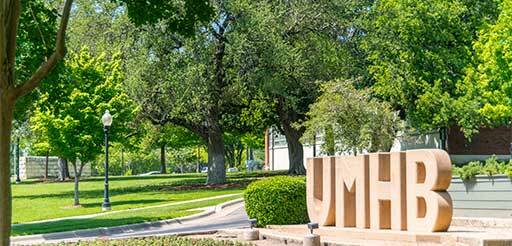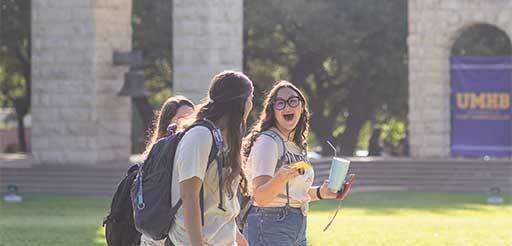Technical Standards for Admission, Continuation, and Graduation
Individuals admitted to the University of Mary Hardin-Baylor MSPA program must possess the physical and mental capabilities to complete the entire curriculum to graduate and achieve a Master’s of Science degree. This curriculum requires demonstrated proficiency in a variety of cognitive, problem-solving, manipulative, communicative, and interpersonal skills. The following is a list of technical standards that specify the attributes and behaviors considered essential for successful completion of UMHB MSPA training. Student must have the physical and emotional stamina and capacity to function in a competent manner in the classroom, laboratory, and clinical setting. These settings may include heavy workloads, long hours, and stressful situations. The following list of skills is illustrative and does not represent an all-inclusive listing of the functions to be a successful UMHB MSPA student.
Observational Skills
To include functional use of vision, hearing, olfaction, and tactile sensations sufficient to perceive all information during educational delivery and evaluation and treatment of patients.
- Observe lecture and laboratory demonstrations
- Read and interpret lecture, laboratory, and professional literature
- Read and interpret patient charts, equipment, and medical reports
- View video, graphics, and written word on the smart screen
- Observe patients accurately at a distance and close at hand
- Monitor and assess physical, emotional, and psychological responses of other individuals
- Hear verbal instructions, audio, video, DVD, or computer media in the classroom, laboratory, and clinical setting
- Perform effective auditory assessment of the lungs, heart, abdomen, pulses, and blood pressure
- Hear and react appropriately to alarms, emergency signals, times, and cries for help
- Evaluate temperature, texture, moisture, vibration, muscle tone, and anatomical structures through hands-on application
Communication Skills
To communicate in verbal, nonverbal, and written formats effectively and sensitively with patients, family, faculty, and other students.
- Receive, write, and interpret written and verbal communication in a timely manner
- Demonstrate interpersonal skills as needed for productive classroom discussion, respectful interactions with classmates and faculty, and development of appropriate provider-patient relationships
- Describe changes in mood, activity, and posture of patients
- Perceive nonverbal communications
- Effectively communicate with other individuals
Motor Skills
Required to sufficiently and safely perform the physical functions of a physician assistant student.
- Coordination of gross and fine muscular movements, equilibrium, and sensation
- Motor function to elicit information from patients by palpation, auscultation, percussion, movement of limbs, and other diagnostic maneuvers
- Perform intervention techniques with proper positioning, hand placement, direction, and amount of force
- Manipulation of tools and equipment commonly used for patient screening and testing.
- Move within rooms and from room to room, including maneuvering in small spaces and around equipment and other individuals
- Participate in lecture, lab, and other learning activities for 30+ hours per week, including but not limited to maintaining an upright posture for prolonged periods
- Legibly recording information related to written assignments, exams, evaluation, progress notes, and medical record documentation
- Execute motor movements reasonably required to provide general medical care and emergency treatments to patients. Examples: Cardiopulmonary resuscitation, administration of intravenous medication, application of pressure to stop bleeding, opening of obstructed airways, suturing wounds, and obstetrical maneuvers
Intellectual, Conceptual, Integrative, and Quantitative Abilities
Required to complete the full curriculum and achieve the level of competence delineated by the UMHB MSPA program.
- Ability to apply a critical thinking process to his/her work in the classroom and clinical settings
- Ability to measure, calculate, synthesize, and analyze a large and complex volume of medical and surgical information
- Ability to learn, retrieve, reason, analyze, sequence, organize, synthesize, and integrate information efficiently
- Ability to comprehend three-dimensional relationships and the spatial relationships of structures
Behavioral and Social Attributes
To meet responsibilities related to the academic and clinical requirements of the UMHB MSPA program.
- Emotional health to fully use his/her intellectual ability, exercise good judgment, complete all responsibilities, and attend to the diagnosis and care of patients
- Possess qualities of adaptability, flexibility, and ability to function in the face of uncertainty
- Possess high level of compassion for others, motivation to serve, integrity, ethical value, and consciousness of social values
- Ability to develop mature, sensitive, and effective relationships with patients and colleagues
- Interact appropriately with individuals from all areas of society, cultures, norms, ethnic backgrounds, and belief systems
- Accurately self-assess abilities to accept criticism, and assume responsibility for maintaining professional behavior
- Ability to cope with the mental and emotional rigors of a demanding educational program within the set time constraints
- Cope with the stress of heavy workloads, demanding patients, and critical clinical situations while continuing to function effectively and competently
Technical Standards Accommodations
The American with Disabilities Act defines a disability as a physical or mental impairment that substantially limits one or more major life activities. Reasonable accommodations may be requested to enable an individual with disabilities to meet these technical standards. An accommodation is not reasonable if it poses a direct threat to the health or safety of self and/or other, if making it requires a substantial modification in an essential element of the curriculum, if it lowers academic standards, or if it poses an undue administrative or financial burden. Request from applicants for reasonable accommodations in meeting the technical standards will be reviewed and considered by an officer appointed by the University of Mary Hardin-Baylor. More information about the University of Mary Hardin-Baylor’s procedures for students with disabilities can be found in the Counseling, Testing and Health Services Department.
Participation of MSPA Students as Human Subjects
Students will practice various examination and treatment techniques in the course of required lab and, occasionally, lecture or classroom courses. In order to provide students both a complete perspective on various therapies and the opportunity to learn specific skills, students are expected to practice certain techniques on one another. Any required participation in such exercises will be under the supervision of university faculty, instructors, or clinicians. It must be understood that this participation does not include the genitalia and breast examinations. The students learn to examine and evaluate these anatomical areas using simulators and with professional patients. A student who is uncomfortable with any classroom or lab exercise should discuss his or her concern with the instructor or MSPA program director.
Page last updated June 02, 2023



